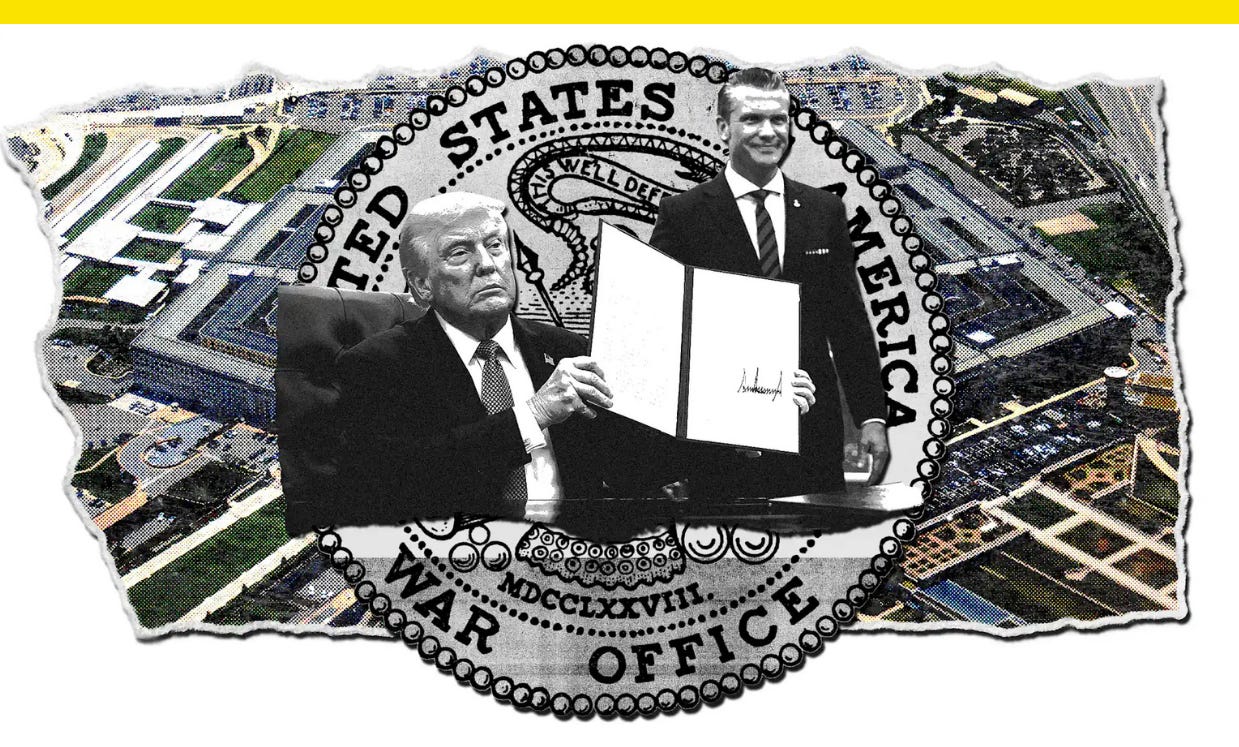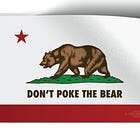The branding reason Trump’s Defense Department rename could run into trouble
Plus: The CDC is killing off this super-effective anti-smoking PSA
The branding reason Trump’s Defense Department rename could run into trouble

In an era of quiet, subtle brand refreshes, President Donald Trump is embracing a full-on rebrand with an executive order that seeks to rename the single largest U.S. government agency.
Trump’s 200th executive order of his second term, signed Sept. 5, gives the Department of Defense the “secondary title” of “Department of War,” an old name for the U.S. military’s government agency before the Army, Navy, Marine Corps, and Air Force were consolidated and renamed the Department of Defense in 1949.
“We’re going Department of War,” Trump said. “I think it’s a much more appropriate name, especially in light of where the world is right now.”
But like getting people to call Twitter “X” or use the phrase “Gulf of America,” Trump could find his attempt at renaming the Defense Department easier said than done. You think changing a logo is hard? Try changing an entire brand name for one of the biggest U.S. employers.
“Changing a name doesn’t change how people feel about you overnight,” brand name expert and Eat My Words founder Alexandra Watkins says.
It’s one thing to change a logo. It’s another to change a name. Trump can’t rename a department on his own without Congress, hence his executive order giving “Department of War” as a secondary name. Still, he’ll face hurdles to implementation that any brand would expect to encounter to undergo a name change.
“Big organizations don’t, or shouldn’t, take the decision to rebrand lightly,” Ben Weis, a strategy director at the naming and writing studio A Hundred Monkeys, tells me. “The bigger the organization and the more widespread the name, the bigger the lift and the higher the risk for blowback and confusion.”
For the Department of Defense, or DOD, with its nearly 3 million military and civilian employees, the risk for blowback and confusion is uncommonly high. Pentagon officials are already fuming over the costs and work that could come with a branding change for an organization that has more than 700,000 facilities across every state and in 40 countries, according to Politico.
Not the first rebrand
The DOD was briefly called the National Military Establishment, but the name had the unfortunately aggressive acronym NME, which sounds like “enemy,” and it was changed less than two years later. Trump’s impetus for changing the name now is less pressing.
The DOD isn’t a company, so it doesn’t have to play by the same rules as a corporate rebrand, but Scott Milano, founder of the brand naming agency Tanj, says it fits into one of the buckets he often sees with renaming efforts.
“Normally, when businesses try to rebrand, there’s either a problem, like some sort of brand-specific problem, or in the case of naming . . . there’s a trademark issue, like you can’t use it moving forward,” he says. “Obviously that’s not the case with the Department of Defense.”
The more relevant way to frame it, he says, is when businesses outgrow their name and want to signal something new to the market, as he sees Trump doing with the change from “Defense” to “War.”
“It’s intentionally intimidating and it’s in your face, and I assume that was on purpose,” he says.
But being obvious isn’t always seen as a virtue when it comes to picking a brand name. In fact, experts say, it can undermine the message the organization is trying to send.
“Honest people don’t tell you that they are honest, cool people don’t talk about how cool they are, and truly strong people don’t puff their chests out — the world knows this,” Igor Naming Agency cofounder Steve Manning says. “It’s a reaction to feeling we are being seen as militarily impotent. Since this rebranding is nothing more than a surface treatment, it will be ineffective for the three years it will be in place.”
The CDC is killing this super-effective anti-smoking PSA
Smoking is the leading cause of preventable death in the U.S., but a long-standing and effective anti-smoking ad campaign that brought that number down is now ending.
The U.S. Centers for Disease Control and Prevention’s “Tips From Former Smokers” ads will stop airing at the end of September due to a reorganization that eliminates or reassigns the agency’s work on chronic disease, according to CBS News, which first reported the ad campaign’s upcoming discontinuation. A CDC spokesperson confirmed to me the campaign will end Sept. 28 and said the agency would continue providing resources for individuals who want to quit smoking.
Launched in 2012, the “Tips From Former Smokers” public service announcements featured testimonials from real-life former smokers who shared their personal experiences. Their heartfelt calls to action encouraged viewers that they could quit too, like the message from Terrie, a North Carolina woman who spoke with the assistance of an electronic voice box. The former smokers in the PSAs opened up about health issues that resulted from years of smoking: cancer, gum disease, heart disease, HIV complications, and stroke. They were convincing.
The first ads in the series aired for just four months, but at a cost of $48 million, they had a high return on investment. The CDC says about 1 million people successfully quit because of the campaign, making its cost only $480 per smoker who quit. The campaign was estimated to have saved $7.3 billion in healthcare sector costs and prevented 129,100 premature deaths by 2018.
The ads are also popular. An August Ipsos poll found 72% of Americans believe “television, online, and print advertisements aimed at reducing smoking or encouraging people to quit smoking are important,” though that varies by party affiliation. Democrats (82%) and Republicans (71%) are more likely to say they’re important than independents (67%). Still, a majority of those polled in each party agreed that such advertisements are important.
The end of the CDC’s anti-smoking PSAs will come amid major downsizing and reorganization at the agency, which is seeing layoffs, firings, and mass resignations over anti-vaccine policies under Health and Human Services Secretary Robert F. Kennedy Jr. Former CDC director Susan Monarez was fired last week after opposing Kennedy’s vaccine policy changes, and other top CDC officials have resigned, too, saying Kennedy is endangering Americans’ health.
The end of “Tips From Former Smokers” isn’t the only thing the U.S. health system is losing under the second Trump administration. A new HHS budget makes cuts to primary care; care for mental and behavioral health, HIV/AIDS, environmental health, and maternal and child health; and the health workforce. And last month, the National Crime Prevention Council began selling “Take a Bite Out of DOGE” merch featuring McGruff the Crime Dog in order to raise money after Department of Government Efficiency cuts forced the nonprofit organization to put a public service announcement on hold amid an anti-fentanyl campaign.
The anti-smoking campaign’s end, though, is great news for tobacco companies. A study published in the Journal of Smoking Cessation in 2022 found “Tips From Former Smokers” wasn’t only good at convincing people to stop smoking, it also helped former smokers from relapsing.
Have you seen this?
“New” font in Grand Teton National Park signs is a nod to the past. The narrow, rounded font once seen throughout the park is being replaced by a sans-serif font that marks a return to the look of the park’s original signage from the 1930s. [Jackson Hole News & Guide]
Google admits the open web is in “rapid decline.” For months, Google has maintained that the web is “thriving,” A.I. isn’t tanking traffic, and its search engine is sending people to a wider variety of websites than ever. But in a court filing from last week, Google admitted that “the open web is already in rapid decline.” [The Verge]
Trump declares War Department. The president is rebranding the U.S. government’s biggest agency for war and asking his supporters for money to help get into heaven while FLOTUS is warning that the robots aren’t coming, they’re already here. At least the VMAs are good again. [Whig]
History of political design
Chesterfield Cigarettes print ad starring Ronald Reagan (1952). Before entering politics, actor Ronald Reagan appeared in ads for the cigarette brand that he praised for its “mildness.” When Reagan later became president, a Democratic lawmaker brought one of his old cigarette ad to the Senate floor with him in 1982 to speak out in favor of a bill to add five rotating warning labels to cigarette packaging.
Portions of this newsletter were first published in Fast Company.








